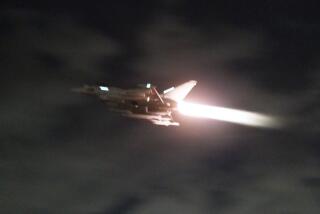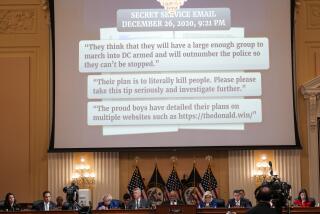U.S. Foresees Threat From Iraqi Agents
- Share via
RIYADH, Saudi Arabia — The United States has “credible information” that Baghdad has dispatched agents to many parts of the world to commit terrorist acts in the event of a U.S. invasion of Iraq, a well-placed Western diplomat said here Tuesday.
The agents are poised to strike targets in the Middle East and Europe, raising concerns among Western officials that the U.S. will be unable to confine a war with Iraq to the battlefield of its choice, according to the diplomat, who spoke on condition that neither he nor his country be identified.
“We have credible information that this is something the Iraqis have planned and are ready to carry out -- not just in Saudi Arabia,” said the diplomat, who has many years of experience in the Middle East. “We think it’s very serious, not just here, but worldwide as well.”
If Iraqi agents are indeed waiting in different corners of the globe, organized in sleeper cells that will be activated when a war starts, it would be another example of Baghdad preparing to fight a war on its own terms, hoping to counter the United States’ far superior conventional military strength.
Iraqi officials have already said, for instance, that they would try to lure attacking forces into urban areas, where Iraqis might have a fighting chance. Terrorism would provide another front for Iraq.
“The concern is not that there is a credible Iraqi military threat,” the diplomat said. “We are concerned about the increased likelihood of terrorist attacks.”
In the past, U.S. officials have said that one of the main reasons for launching an attack on Iraq is to prevent President Saddam Hussein from developing weapons of mass destruction and then delivering those weapons into the hands of terrorist groups. Now, the U.S. is fearful that Iraq is poised to use its own agents as terrorists, although there is no information that any have been armed with weapons of mass destruction.
In Washington, officials confirmed Tuesday that U.S. intelligence agencies have picked up “a lot of chatter” on the Iraqi intelligence circuit in the last month that has led to warnings at several major U.S. embassies. Among those have been the missions in Egypt, Thailand and South Africa, the officials said.
The intelligence community believes that the chatter is either “willing disinformation to wind us up” or refers to assets in place that the United States does not know about, said a well-placed U.S. official who requested anonymity.
“Either way,” the official said, “we have to prepare for it.”
Washington has no solid estimate of either the numbers involved or their capabilities, the source said. One source said that the U.S. is sufficiently in the dark that it is unsure whether the threat is from “five guys working out of a single apartment” or something much bigger.
Because of the new concerns about the sleeper cells, some U.S. officials were surprised to see a lowering of the national terrorism alert level last week from orange to yellow.
Some key personnel believe that the chatter is probably disinformation, although it “outstrips” what the United States has seen or tapped in the past, the U.S. official added. Over the last decade, U.S. intelligence has kept a close and effective watch on Iraqi intelligence.
Another knowledgeable U.S. official in Washington confirmed that authorities have received “credible information” about Iraqi terrorist cells having been sent to several cities overseas, where they are believed to be poised to attack Americans or U.S. institutions.
“They did it before, in the Gulf War,” said the official, who declined to be named.
During the 1991 war, the United States uncovered a number of sleeper operations, including a potentially major plot to attack U.S. targets and interests in Thailand’s capital, Bangkok. Iraqi intelligence was also linked to an alleged assassination attempt on former President Bush during a visit he paid to Kuwait in 1993.
In 1991, the Iraqi efforts failed, U.S. officials have said. This time, however, U.S. officials believe that Iraq may be more effective.
Key U.S. ally Jordan, for example, has several hundred thousand Iraqi expatriates living within its borders -- many of whom arrived after the last war. Jordanian officials have become increasingly concerned that Iraqi intelligence has infiltrated the country and, in the event of war, would do what it could to destabilize the kingdom. As part of an overall security effort, the government has been rounding up large numbers of Iraqis without proper visas and sending them back to Iraq.
“Jordan is a place [where] Iraqis have been able to operate on the ground,” the diplomat said.
But the threat extends farther than Jordan, which shares a border with Iraq. For instance, the Philippine government recently expelled an Iraqi diplomat after evidence surfaced that he was in touch by telephone with a member of the Abu Sayyaf rebel group connected to a bomb attack that killed a Green Beret. Intelligence officials suggest that the Iraqi diplomat may have been seeking terrorists to carry out attacks against Americans.
The threat could also include European countries, the Western diplomat said, and those in the Persian Gulf, such as Kuwait -- which recently arrested an Iraqi and charged him with spying -- and Saudi Arabia.
Although Saudi officials have not identified Iraqi sleeper cells operating in the country, they have acknowledged that there is a broader problem with terrorist activities here, which they expect will increase in the event of war with Iraq.
“The threat here is they are going to attack Westerners,” said a security expert with years of experience working in Saudi Arabia.
“The hope is to make the Westerners leave [and that] this will have a massive effect on the local economy.... They are working to destabilize the government, and the Saudis know that.”
Saudi officials have launched a far-reaching crackdown on suspected terrorists and their sympathizers but so far have been unable to stop a spate of shootings, killings and bombings that has spooked the thousands of Westerners living here.
In recent weeks, Saudi Arabia has announced the arrest of seven young men for links to an “illegal group,” sent 90 men to trial for having ties to the Al Qaeda terrorist network and confirmed that about 250 men are under investigation for suspected terrorist connections. Such confirmation represents a huge leap for a country that once denied Al Qaeda’s active presence on its soil.
Even Saudis who insist that the government has the situation under control believe that Westerners -- especially Americans -- won’t be safe here if there is a war.
“It’s not a good time for Westerners to cruise around, really, because those fanatics are small in numbers, but they are dangerous,” said Jamal Khashoggi, deputy editor of the English-language Arab News, which is published in Jidda, Saudi Arabia. Extremists “could do funny stuff. [Westerners] should not really cruise around at this time.”
*
Slackman reported from Riyadh and Wright from Washington. Times staff writer Josh Meyer in Washington contributed to this report.
More to Read
Sign up for Essential California
The most important California stories and recommendations in your inbox every morning.
You may occasionally receive promotional content from the Los Angeles Times.













